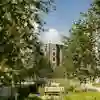Arts, Heritage and Liveability
Do community arts and heritage initiatives in Hull build urban liveability in precarious places?

Project summary
The Challenge
Hull’s City of Culture year in 2017 helped to cement the arts as an important part of the city’s identity and community.
The Approach
This research project builds upon the legacy of Hull’s City of Culture year, by exploring the impact of the arts and cultural sector post 2017.
The Outcome
So far, community members have been unequivocal in their support for community focused arts programmes and their contribution to quality of life.
Institutes and centres
Lead academics
The Challenge
The arts are an essential part of how people experience and engage with the world. Hull’s City of Culture year in 2017 helped to cement the arts as an important part of the city’s identity and community.
There is a growing body of research around the concept of ‘liveability’ and the impact of the arts and culture on the urban environment and wellbeing of communities. Although activities programmed as part of Hull’s City of Culture were evaluated in depth, applying this new approach would enable us to look again at community arts/heritage interventions in the city of Hull and how they intervene in local challenges to improve local ‘liveability’
The Approach
This research project builds upon the legacy of Hull’s City of Culture year, by exploring the impact of the arts and cultural sector post 2017 and how we can understand the effectiveness of community arts programmes on the people and places that they work with.
In particular, it aims to generate a discussion around two arts groups (Absolutely Cultured & Back to Ours) and their role in improving access to community arts and local ‘liveability’. Through this, it hopes to identify the kinds of socially engaged art taking place in the city and its importance, as well as identifying any challenges that arts organisations are now facing, particularly in the wake of the most recent cost of living crisis.
Over the last few months the project has been working with Back to Ours and Absolutely Cultured, to undertake a series of interviews and workshops with community participants and volunteers, asking them to express how they view socially engaged art in Hull and its capacity for addressing social and environmental issues. The discussions from these have been both emotive and powerful in their recognition of how the arts and community engagement can be a real benefit to people’s quality of life particularly during periods of isolation.
At the same time the project was also part of developing a Creative Climate Workshop held in April 2023, in partnership with the Risky Cities Project and We Are Creative, which utilised arts-based approaches to encourage participants to discuss how the cultural sector can contribute to wider climate and environmental challenges. Throughout the day, a number of draft recommendations were developed which challenged wider exploitative funding structures, and presented options through which individuals, local and national government could develop which would support the arts sector to be more sustainable and a greater part of addressing climate change.
Art is an important part of any town and city and the powers that be should focus on grassroots fundingProject Participant, 2023
The Impact
While the project is still ongoing it intends to add to the growing body of evidence that identifies the value of arts to local communities, the environment and wider liveability. So far, community members have been unequivocal in their support for community focused arts programmes and their capacity to contribute to quality of life. This is especially the case for the role they play in addressing concerns relating to mental health, community cohesion and critical climate consciousness.
Similarly, arts practitioners have expressed their frustration and lack of support during periods of crisis (Covid-19 and cost of living), and at being left out of discussions concerning local environmental and climate change.
Through these findings we hope to generate an evidence base which can be used to support the development of city’s future Cultural Strategy in 2026 and ensure that both the community and arts sector are able to have greater agency in the city’s future decision making.
What happened next
Building on the outcomes of the Arts, Heritage and Liveability project, we secured 12 months of HIKE funding (2024–2025) to strengthen collaboration with Hull City Council, Absolutely Cultured, and Back to Ours in the development of the city’s 2026 Cultural Strategy. During this phase, we delivered a series of community-led workshops and supported the growth of an arts and heritage network designed to promote a more inclusive, sustainable, and community-focused cultural sector in Hull.




